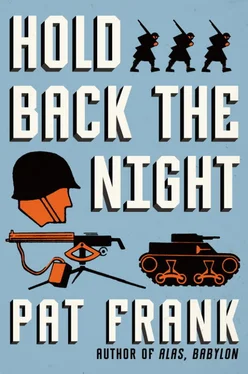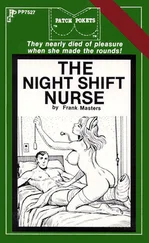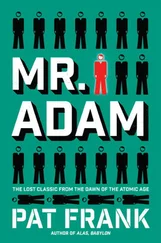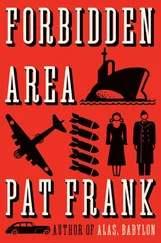“Sure, I think she ought to get a car,” Ekland agreed.
“When I get home,” said Petrucci, “I’m going to get a convertible. Cream-colored.”
“I think she ought to get a car right now,” Ekland went on, “because I think this thing is going to last a long time, and it’s going to get worse, and pretty soon it’ll be like last time. No cars.”
“MacArthur says it’s all over. Ekland says it’s just starting. Who knows more, Ekland or MacArthur?” said Petrucci.
“About some things, MacArthur. About other things, me,” said Ekland. “MacArthur hasn’t been home in a long time. Years. He doesn’t know what the people are thinking. He remembers how it was after the last war, everybody screaming to bring the boys home. So it’s smart, politically, to talk about bringing the boys back home. That’s what he thinks, but he’s operating on past performance, and this is a different horse. Nobody wants us to come home this time. They want us to stay out here and fight. They’d rather have us fight on the Yalu than on theMississippi.”
“Personally,” said Petrucci, “I have fit enough.”
“Look,” said Ekland. “Nobody stuck a bayonet up your ass and said, ‘You’re a Marine!’”
“Now don’t get sore, sarge,” said Petrucci.
“I’m not sore. But we’re all here because we wanted to be here. Maybe for different reasons. Milt, he stayed in the reserve. Maybe he wanted that Navy gravy.” The Marine Corps reservists got their checks from the Navy Department. “You others, you all volunteered. I don’t know why. I don’t give a damn. But you know why. And this is where you wanted to be—right here.”
“Not me,” said Petrucci, a slim, olive-skinned boy over six foot. “I want to be in a cream-colored convertible driving out the Parkway.”
“With a broad,” Heinzerling added.
“Yeah, with a broad. Now I know a real hot thing who lives in Jackson Heights, and she—”
“I tell you what,” Ekland interrupted. “You may get a drive out the Parkway—in a box—with your dog tags on it instead of a license plate. Because these Chinks aren’t through. Their top guy, Mao—I can’t pronounce it—he isn’t through. He wants you, Petrucci, and he wants me.”
Vermillion, one of the captain’s runners, stuck his head through the tent flap, his breath steaming in front of his face as if he had come in a hurry, and said, “Kato here?” He saw Kato, flat on his back on his sleeping bag, with his eyes closed. “Kato. Skipper wants you. Right now!”
Kato lifted his head. “Yeah? Why?”
“He’s got Beany Smith up at mast. Some gook woman claims he tried to rape her.”
“Who’d want to rape a gook?” said Kato, lifting his head. “Particularly a Ko-Bong gook.” Kato, whose ancestry included Polynesian, Japanese, Chinese, and New England missionary, or so he believed, was undisturbed by the fact that sometimes gooks mistook him for a fellow gook.
“Beany Smith, he’d want to rape a gook,” said Heinzerling. “And maybe me, maybe I’d want to rape a gook, right now.”
“Kato, scram out of here!” Ekland commanded, suddenly serious and authoritative. If the captain was kept waiting, somebody’s hide would fry, and Ekland didn’t want it to be his.
Kato came to his feet in a lazy and yet lithe motion, and was gone.
“Now in Pusan,” said Heinzerling, “I saw some gook women who weren’t too bad. But I hear tell these Japanese girls, they’re terrific. Now, if I get leave in Tokyo, the first thing I’m going to do is…”
And they went back to their talk of women.
Geography is the scorecard of war, and so there were thousands of maps among the American forces in Korea, in addition to the one tacked on Ekland’s tentpole, and one of the most detailed of these was in the war room of the group which called itself JANAIC, in the South Korean city of Taejon. JANAIC meant Joint Army Navy Air Intentions-of-the-enemy Council. Of course this was a name that nobody could remember, and that is why it called itself JANAIC.
JANAIC had been established, when the war matured, to speed analysis about what the enemy intended to do. If news and information and intelligence about the enemy followed the long and twisting chain of command, with usual military rigidity, then everything from Korea would have to be funneled through Tokyo and Washington before it came back to Korea. JANAIC had been set up to short-circuit these attenuated communications. It sounded like a good idea at the time, but like all councils on what everyone calls “the very highest level,” it had no troops, and no authority.
JANAIC could analyze, JANAIC could deduce, JANAIC could ponder, and JANAIC could recommend. But JANAIC could not act, and so when the Red tide receded, JANAIC found itself in a backwash. Who cared about the enemy if the war was practically over? What was really important was the shipping schedule, Stateside-bound.
Nevertheless, on this evening JANAIC met as usual in its room in the modern brick schoolhouse. Unless JANAIC was in session, the map was covered with black curtains, and the room was guarded. For this map held all the secrets—the movements of fleets and air groups and divisions, the locations of headquarters and ammunition dumps and prospective airfields, the crayoned black circles on the acetate overlays that told of friendly forces operating in enemy territory.
The map dominated the front wall of the schoolroom and hid the blackboards. There were only four men in the room, each cramped in a child’s desk, attentive to the map as if it were the teacher. Two of the men were drinking coffee from paper cups, and all were smoking. There was an admiral, an air general, a general with paratrooper’s insigne on his chest, and a major, his oak leaves drab under all the stars around him.
The admiral and the two generals, Air and Infantry, comprised JANAIC. They were selected for the job because they were, in Army slang, “brains.” The headlines, and quick promotion, usually went to the swashbuckling fighters, like Patton. But recently “brains” had been doing better in the military services. Eisenhower was a “brain,” and so was Gruenther. Marshall had been a “brain,” and so had Zacharias.
Sometimes these three men reached a conclusion, and this conclusion was transmitted to Eighth Army, and Ten Corps, and Seventh Fleet, and Fifth Air Force. Often they were bewildered, and could not agree, for the enemy’s tactics were rubbery and his political and military maneuvers seemingly erratic, although his strategic objective was always clear—the isolation and destruction of the one power that stood between him and hegemony over the world.
Major Toomey, freshly arrived from the United States and attached to Staff, First Marine Division, had been invited to the council because, reputedly, he knew a good deal about the Chinese. In spite of the Tokyo communiqué, JANAIC was still worried about the Chinese. The Chinese were quiet, yes, but the red goose eggs on the map, representing new enemy units, had been multiplying daily, until now they interlaced into a solid mass all along the front.
Further, something stirred in Manchuria, disturbing as the rustle of leaves when there is no wind. From Saigon and Hong Kong and New Delhi, gathered by intelligence, and funneled through Washington to Tokyo and finally Korea, were coded cables that the Communists had massed new armies above the Yalu, and Mao Tse-tung had bent the bow, and nothing could stay release of the arrow. When air reconnaissance is impossible, not because of weather but because of policy, and patrols bloody their noses against the foe, and the communiques of the theater general conflict with the reports of intelligence, then is the time to be wary, and call in an expert. So JANAIC had called in Major Toomey.
Читать дальше












